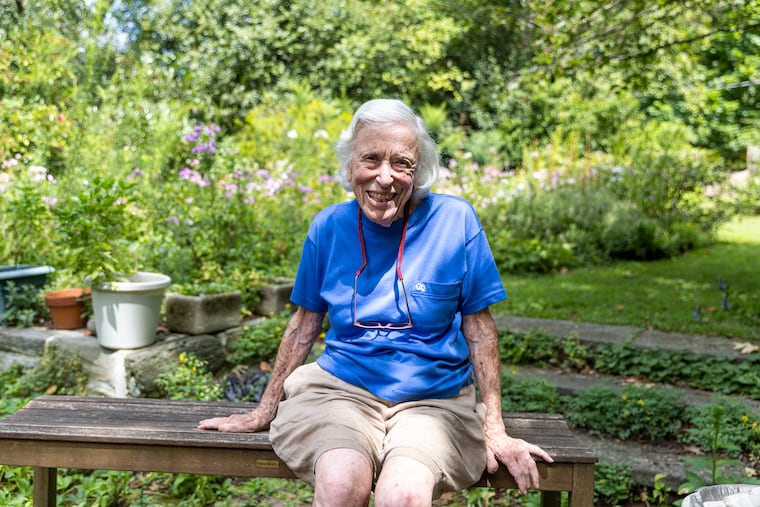Meet the 96-year-old Philly geneticist who wants you to know ‘SuperAgers’ are ‘not old and decrepit or whatever’
“SuperAgers” Family Study research effort looks at the genetics of longevity: “We want to understand what helps people to live not only long lives, but also healthy lives,” a researcher said.

When Hope Punnett was first recruited to participate in a study on people over the age of 95, she didn’t think twice about signing up: “Having been in human research, I know how hard it can be to find volunteers,” she said, laughing.
The 96-year-old is a celebrated scientist who ran the genetics lab at St. Christopher’s Hospital for Children for decades. She still attends lectures there on occasion. Her active social life includes membership in a Northwest Philadelphia group for older adults, and she delights growing azaleas and rhododendrons in the garden at her West Mount Airy home.
Besides the chance to help out fellow researchers, Punnett had another motive for participating in the study.
“People should be aware that people my age are not old and decrepit or whatever,” she said. “Sometimes, we forget how old we are.”
Called the “SuperAgers” Family Study, the research effort conducted by the American Federation for Aging Research and New York’s Albert Einstein College of Medicine aims to recruit 10,000 participants over the age of 95 — the largest study of longevity ever, researchers say.
“We want to understand what helps people to live not only long lives, but also healthy lives,” said Sofyia Milman, the director of human longevity studies at Einstein’s Institute for Aging Research. “We want to look at outliers, who have not aged like the rest of us, to see if we can understand what’s driving their healthy longevity.”
Researchers are collecting medical histories and DNA samples from “superager” participants — and in some cases, their children — in an effort to identify genes that may contribute to longevity. Punnett, like other participants, sent her DNA sample in a few months ago. (She hasn’t talked to the researchers personally. Milman says because of the size of the study, it’s hard for principal researchers to speak to every participant.)
Previous studies have identified some relevant genes, but Milman said progress has been slow because they looked at small numbers of people. Now by recruiting thousands of participants, researchers hope to identify genes that contribute not only to a long life, but also to good health in old age.
“We can use the information we glean to create drugs and therapeutics that will mimic the function of beneficial genes,” she said. “We want to expand the number of healthy years for older adults.”
A lifelong researcher opens her life to study
For Punnett, the advances in genetics over the last several decades have been “overwhelming and amazing.”
When she first began working at St. Christopher’s in 1963, physicians did not typically categorize birth defects as inherited genetic disorders. “I learned to make some diagnoses of different genetic conditions that [doctors] were not necessarily aware of,” she said.
Punnett and her colleagues worked to diagnose patients at the hospital and research genetic disorders that had not yet been identified. The work that she considers some of her most important was on a team that discovered DiGeorge syndrome, a chromosomal disorder that causes heart defects, intellectual disabilities and cleft palates.
She delighted in meeting patients, taking particular pride in those she diagnosed as babies who many years later returned to St. Christopher’s with questions about their own children. “It was a remarkably rewarding experience,” she said.
Punnett credits her own longevity in part to staying active — and having a robust social life. She’s a member of the Village Movement, an organization aimed at helping older adults age at home. “One of the important things that comes out over and over again in the literature is being able to socialize,” she said.
She uses Zoom to watch the medical teams making grand rounds presentations at St. Christopher’s, and Facebook and email to keep in touch with friends and family outside of Philadelphia.
“She’s never without activity of one kind or another,” said Jill Landau, one of Punnett’s three daughters. “She’s not a sit-around kind of person. She generates her own energy for a lot of things that she enjoys.”
Punnett also keeps a sprawling garden behind her home, stocked with native flowering plants and a host of vegetables. “My father loved to garden, my brothers love to garden — it must be a gene,” she joked.
Punnett suspects her longevity is genetic, too: Her father died at 96, and her grandfather lived to 90. “I’ve just been very lucky,” she said.